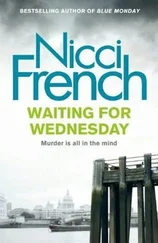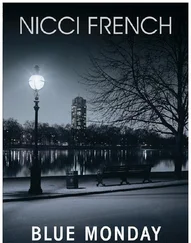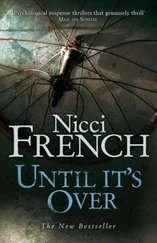Frieda thought for a moment. ‘He seemed understanding, maybe even too much so. He found it hard to express anger. I found him to be a gentle, self-doubting kind of man. Carrie – Mrs Dekker – was angry on his behalf. She was very protective of him. It doesn’t surprise me that she’s the one complaining for Alan.’
‘But that wasn’t the only time you crossed a boundary, was it?’ said Krull.
Frieda met his eyes. ‘The case turned out to be complicated. Alan was adopted. He discovered – no, I discovered and told him – that he was an identical twin. He had a brother, whom he knew nothing about, and yet they had an extraordinary psychological similarity and also a kind of connection, an affinity if you will. They saw things in the same way, to some extent. Not surprisingly, this discovery was disturbing to Alan. It was this brother who had taken Matthew: Dean Reeve – a household name now, the nation’s favourite bogeyman.’
‘Who killed himself.’
‘He hanged himself under a bridge by a canal over in Hackney when he knew he couldn’t escape us. However much Alan hated the thought of his brother, he loved him as well. At least, he felt he had lost part of himself when he died. He must have suffered a great deal. But that’s not what Carrie means when she talks about me using him.’ Frieda looked at the three of them with her large, dark eyes. ‘On one occasion,’ she continued, ‘I talked to him as a way of entering his brother’s mind, of trying to find out what his brother was thinking. Without telling him. If I’d told him, it wouldn’t have worked.’
‘So you did use him?’
‘Yes,’ said Frieda. They were all struck by her voice, which sounded angry rather than conciliatory.
‘Do you think that was wrong?’
Frieda was silent for several moment, frowning. She let herself slide back into the darkness of the case, among its shadows and its inky dread. Her patient Alan had turned out to be the identical twin of Dean, a psychopath who had abducted not only Matthew but, twenty years previously, a little girl. And that little girl Joanna, once skinny and gap-toothed and shy, mourned without cease by her family, had turned out to be the fat, lethargic wife of Dean, hiding in plain sight, a victim turned perpetrator. It was Sasha’s DNA test that had proved the obese, chain-smoking Terry was knock-kneed Joanna, that Dean’s willing collaborator was also his victim. What was more – and this was what Frieda still thought about when she stalked the London streets at night until she was so tired she could sleep, and what she still dreamed about – Frieda’s discovery of the freakish similarity between the twins had led to the abduction of a young research student, whose body had never been found. She thought of Kathy Ripon’s clever, likeable face and the future she would not have. Perhaps her parents were still waiting for her to return, their hearts turning at every knock on the door. These people, her judges, asked her if what she had done was wrong, as if there was a simple answer; a truth that was not slippery and treacherous. She lifted her eyes and faced them again.
‘Yes,’ she said, very clearly. ‘I wronged Alan Dekker, as my patient. But I don’t know if I was wrong. Or, at least, I think I was both wrong and right in what I did. What Alan said to me on that day led directly to Matthew. He saved a little boy’s life, there’s no doubt about that. I thought he was glad he had helped. I know that time alters the way one thinks about things, and I have no idea what he’s been through since then, but I don’t understand why now, a year and a bit later, he would want to complain about something that at the time he accepted. Can I say one more thing?’
‘Please.’ Professor Krull made a courtly gesture with his thin, blue-veined hands.
‘Carrie talks about me putting my career before her husband’s peace of mind and happiness. I did not further my career. I do not work for the police and have no interest in being a detective. A young woman disappeared because of my actions, and I live with that. But that is a separate issue, not what we’re talking about now. As a therapist, I believe in self-knowledge, in autonomy. What people discover about themselves during therapy may not lead to peace or to happiness. Indeed, it often doesn’t. But it can lead to the possibility of turning what is unbearable into what is bearable, of taking responsibility for yourself and having a degree of control over your own life. That is what I do, as far as I can. Happiness …’ Frieda raised both hands in an expressive gesture and fell silent.
‘So if you were asked to apologize …’
‘Apologize? For what? To whom? I’d like to know what Alan has to say in all of this. He shouldn’t be letting his wife be his mouthpiece.’
There was an awkward silence, and then Thelma Scott said in a dry voice: ‘As far as I know, Mr Dekker has nothing to say.’
‘I don’t understand.’
‘I imagine you don’t. The complaint appears to come from Mrs Dekker.’
‘On his behalf.’
‘Well. So one would assume.’
‘Wait. Are you telling me that Alan has nothing to do with this?’
‘I’m not sure.’ Professor Krull looked embarrassed.
‘What’s this for?’ Frieda made a gesture at the long oval table, the woman taking the minutes at the far end, the portraits of august members of the council hanging on the walls. ‘I thought it was to investigate a complaint made, however indirectly, by a patient. Since when are we responsible for dissatisfaction felt by the partner of a patient? What am I doing here? What are you all doing here?’
Professor Krull cleared his throat. ‘We want to head off any possibility of litigation. Smooth things over.’
Frieda stood up abruptly, her chair scraping over the wooden boards. Her voice was quivering with suppressed fury as she said, ‘ Smooth things over? You want me to apologize for something I believe to be justified, or at least not unjustified, to someone who wasn’t involved anyway?’
‘Dr Klein,’ said Krull.
‘Frieda,’ said Jasmine Barber. ‘Please wait.’
Thelma Scott said nothing; her grey eyes followed Frieda.
‘I’ve got better things to do with my time.’
She took her coat from the back of the chair and walked out, making sure not to bang the door behind her. As she went along the corridor towards the front entrance, she caught a glimpse of a woman going down the stairs on her left and stopped. Something about the sturdy frame, the short brown hair, was familiar. She shook her head, continued towards the exit, but then changed her mind and turned back, taking the stairs to the canteen. And she was right: it was Carrie Dekker, Alan’s wife, the woman who had just made her sit through the charade upstairs. In the year since she had seen her, she seemed to have grown shorter, stockier, older, more tired. Her brown hair was shaggy. Frieda waited while Carrie got herself a mug of coffee and took a seat in the corner, next to a radiator, then approached her.
‘Can I join you for a moment?’
Carrie stared at her, her face tightening with hostility. ‘You’ve got a nerve,’ she said.
Frieda took the chair opposite her. ‘I thought we should talk face to face.’
‘Why aren’t you still being interviewed? You’ve only been in there for a short while.’
‘I wanted to ask you something.’
‘What?’
‘Alan was my patient. Why are you, rather than him directly, making the complaint against me?’
Carrie looked startled. ‘Don’t you know?’
‘Know what?’
‘You’ve really got no idea? You came into our lives. You talked about safety. You told Alan he could trust you. You fed him with ideas about knowledge, about being true to himself. You told him not to be ashamed of anything he felt. You gave him permission.’
Читать дальше












